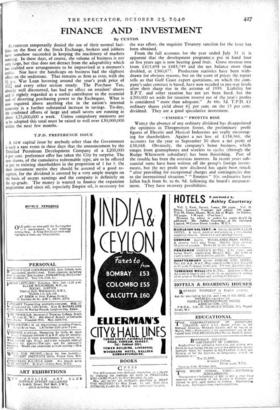FINANCE AND INVESTMENT
By CUSTOS ALTHOUGH temporarily denied the use of their normal faci- lities on the floor of the .Stock Exchange, brokers and jobbers have somehow succeeded in keeping the machinery of markets running. In these days, of course, the volume of business is not very large, but that does not detract from the adaptability which has enabled new arrangements to be improvised at a moment's notice. Nor have the handicaps on business had the slightest effect on the undertone. That -remains as firm as ever, with the 31 p.c. War Loan hovering around the year's peak price of 102i and every other section steady. The Purchase Tax, already well discounted, has had no effect on retailers' shares and is rightly regarded as a useful contributor to the essential task of diverting purchasing power to the Exchequer. What is now required above anything else in the nation's internal economy is a further substantial increase in savings. To-day, the combined efforts of large and small savers are running at about £25,000,000 a week. Unless compulsory measures are to be adopted this total must be raised to well over £30,000,000 within the next few months.
T .P .D . PREFERENCE ISSUE A NEW capital issue by anybody other than the Government is such a rare event in these days that the announcement by the Trinidad Petroleum Development Company of a £200,000 6 per cent. preference offer has taken the City by surprise. The new shares, of the cumulative redeemable type, are to be offered at par to existing shareholders in the proportion of 1 for 5. On their investment merits they should be assured of a good re- ception, for the dividend is covered by a very ample margin on the basis of recent earnings and the company is definitely on the up-grade. The money is wanted to finance the expansion programme and since oil, especially Empire oil, is necessary for the war effort, the requisite Treasury sanction for the issue has been obtained.
From the full accounts for the year ended July 31 it is apparent that the development programme put in hand four or five years ago is now bearing good fruit. Gross revenue rose from £415,698 to £683,749 and the net balance more than doubled, at £360,677. Production statistics have been with- drawn for obvious reasons, but on the score of prices the report tells us that Gulf Coast export quotations, on which the com- pany's sales contract is based, have now receded to pre-war levels after their sharp rise in the autumn of 1939. Liability for E.P.T. and other taxation has not yet been fixed, but the £200,000 set aside for taxation reserve out of the year's profits is considered "more than adequate." At 46s. 3d. T.P.D. £1 ordinary shares yield about 61 per cent. on the 15 per cent. dividend. They are a good speculative investment.
" EMMIES " PROFITS RISE WHILE the absence of any ordinary dividend has disappointed the optimists in Throgmorton Street, the preliminary profit figures of Electric and Musical Industries are really encourag- ing for shareholders. Against a net loss of £138,968, the accounts for the year to September 30 show a net profit of £38,048. Obviously, the company's home business, which ranges from gramophones and wireless to cycles (through the Rudge Whitworth subsidiary) has been flourishing. Part of the trouble has been the overseas interests. In recent years sub- stantial sums have been written off the group's foreign invest- ments, but the net profit now disclosed has again been struck "after providing for exceptional charges and contingencies due to the international situation." " Emmies " 10s. ordinaries have fallen back from 8s. to 6s. 9d. following the board's anmounce- ment. They have recovery possibilities.


























 Previous page
Previous page